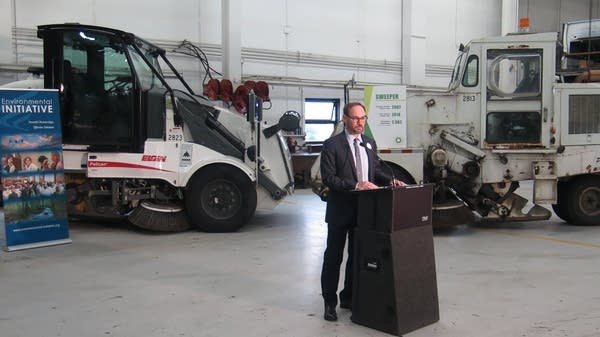St. Paul’s streets will be cleaner with new greener city fleet
Environmental initiative replaces oldest, dirtiest diesels

The city of St. Paul is rolling out nearly a dozen new public works vehicles designed to be more environmentally friendly.
The city paid about $2 million for 10 new pieces of equipment, which include dump trucks, grapple trucks and a street sweeper. A quarter of the cost was covered by a grant from the Environmental Protection Agency.
The program, called Project Green Fleet, is a partnership between the city and the nonprofit Environmental Initiative to reduce air pollution and improve the fuel efficiency of some heavy-lifting vehicles. Environmental advocates say the replacements are the equivalent of removing 20,000 cars from the road.
“Ten units might not sound like a huge piece through the fleet that the city has, but when you think about … the pollution equivalent that this is going to be today, it’s taking more than 20,000 cars off the road,” said Bill Droessler, senior managing director of clean air at Environmental Initiative.
Create a More Connected Minnesota
MPR News is your trusted resource for the news you need. With your support, MPR News brings accessible, courageous journalism and authentic conversation to everyone - free of paywalls and barriers. Your gift makes a difference.
Minnesota’s air quality is generally good, but low to moderate levels of air pollution can cause health impacts, said Jessie Shmool, an epidemiologist with the Minnesota Department of Health.
These effects can disproportionately fall on some people more than others, Shmool said, particularly in urban areas like the city of St. Paul.
“Places where we have more seniors living, more people without health insurance, more people living in poverty and more people of color have higher rates of death, hospitalization and emergency room visits due to air pollution,” said Shmool. “And that’s a problem.”
She said service fleet upgrades are particularly suited for such communities.
St. Paul Mayor Melvin Carter lauded the move as a step towards the city’s goal of carbon neutrality by the year 2050.
“We can do the things that we have historically done in a way that is better and that is more cost-efficient and in a way that is cleaner and contributes to the type of air and environmental quality that we want to have in our community,” Carter said.
Advocates say EPA studies also show a dollar spent on reducing diesel emissions of heavy-lifting vehicles results in $13 to $30 in public health benefits.
Project Green Fleet has been upgrading commercial and public use vehicles, including school buses and towboat since 2005 with an aim to reduce emissions and improve fuel economy.